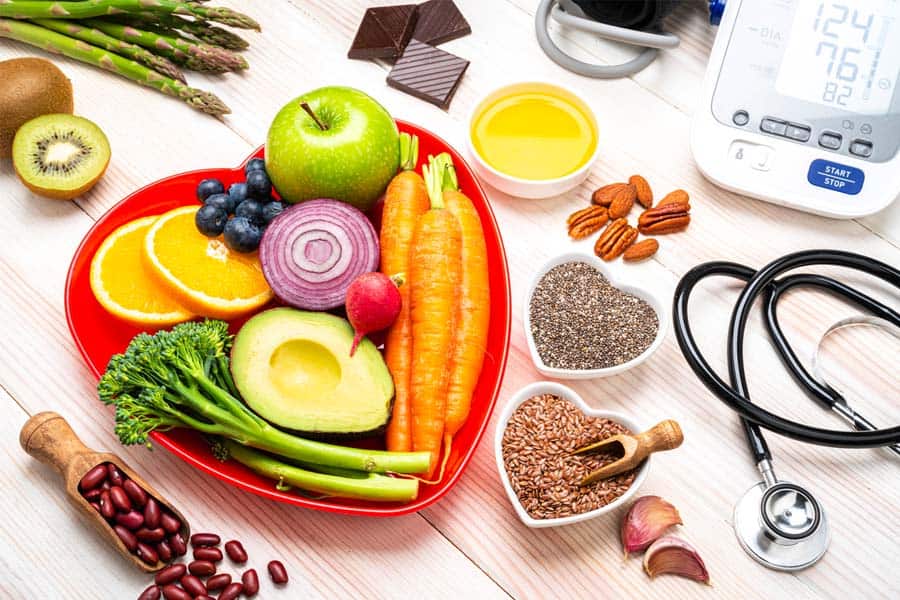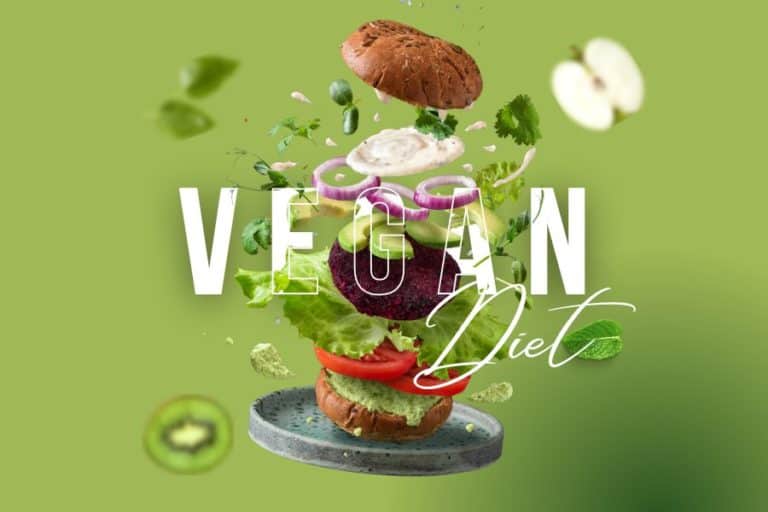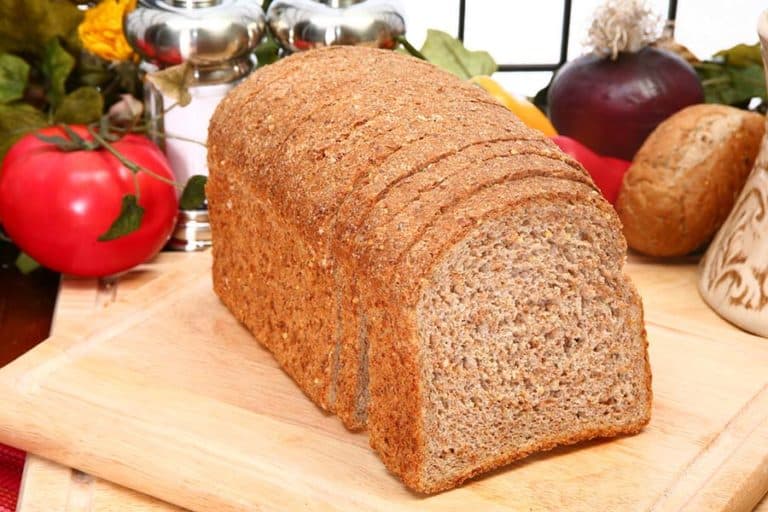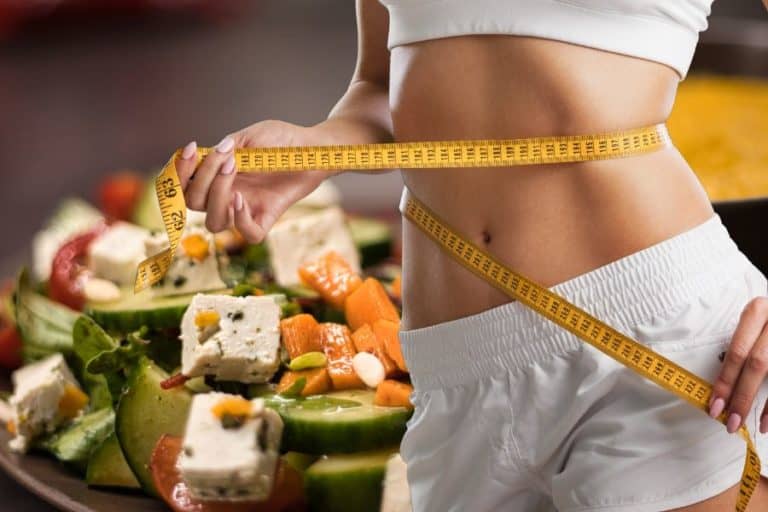Is Being Vegan Healthy? Yes – Here’s Why

Is being vegan healthy | Benefits | Who should not | Risks | Healthy vegan diet | Challenges
A vegan diet is an ethics-based dietary choice that forbids the consumption of animal products like meat, fish, eggs, honey, and dairy. Veganism has also been shown to have numerous health benefits.
Despite its growing fame, there are a lot of doubts and misconceptions about veganism. Many people who want to try this healthy and ethical lifestyle tend to doubt whether it is genuinely healthy.
This article takes an in-depth look at the pros and cons of veganism.
Is being vegan healthy?
A vegan diet is associated with numerous potential health benefits.
Numerous studies have observed that plant-based dietary practices like vegetarian and vegan diets typically tend to be high in fiber and low in saturated fat [1]National Library of Medicine: Comparison of Nutritional Quality of the Vegan, Vegetarian, Semi-Vegetarian, Pesco-Vegetarian and Omnivorous Diet.
This means that a vegan diet is ideal for those looking to improve their overall health. The benefits include a reduced risk of heart disease and certain types of cancer and improved management of type 2 diabetes.
Conversely, it is also true that vegans tend to be at risk for certain kinds of nutritional deficiencies. Nevertheless, a vegan diet can be as healthy as any other if it is balanced and includes all the essential nutrients.
Health benefits of going vegan
There are many good ethical reasons to go vegan—including preventing animal cruelty and promoting environmental sustainability. However, veganism also has numerous health benefits.
1. High in fiber
Vegan diets are usually high in fiber and low in saturated fat. This combination can help to lower cholesterol levels and reduce the risk of heart disease.
Fiber is also beneficial for maintaining a healthy weight because it helps you feel full and stay satisfied after eating. In addition, plant-based foods are usually lower in calories than animal-based foods.
2. Cancer prevention
Veganism has also been linked with a reduced risk of developing certain types of cancer, [2]PubMed: Plant-Based Diets and Cancer Risk: What is the Evidence? such as breast cancer and colorectal cancer.
This may be due to the fact that vegan diets tend to be high in antioxidants and phytochemicals-plant-based substances that have been shown to protect against cancer cell growth.
3. Reduced risk of diabetes
Vegan diets have also been associated with a reduced risk of developing type 2 diabetes. This, again, can be linked to the higher fiber content in plant-based foods, which is beneficial for regulating blood sugar levels.
Studies have also shown that vegans tend to have a lower body mass index [3]National Library of Medicine: Type of Vegetarian Diet, Body Weight, and Prevalence of Type 2 Diabetes (BMI) than people on an omnivorous diet. This is another factor responsible for better diabetes control among vegans.
4. Cardiovascular health
Plant-based foods tend to be rich in antioxidants and healthy fats that can help reduce cholesterol levels.
On the other hand, animal foods contain large amounts of saturated fat and cholesterol. These have been linked to a higher risk of cardiovascular disease.
Opting for a plant-based diet like a vegetarian diet or a vegan diet rich in healthy fats and essential fatty acids is key to better heart health in the long run.
Who should not try the vegan diet?
While the vegan diet has many benefits, it is not suitable for everyone. Some people should avoid the vegan diet or speak with a doctor before trying it.
Pregnant women
Pregnant women need to ensure they get enough nutrients like folate, iron, and choline. These nutrients are essential for the to-be-mothers’ health and the baby’s brain and spine development.
While getting these nutrients from plant-based sources is possible, pregnant women might need supplements to ensure they’re getting enough of the same.
Children
Children need nutrients like vitamin D, calcium, iodine, and omega-3 fatty acids for proper growth and development. These nutrients are generally found in animal products like milk, eggs, and fish.
Children who follow a vegan diet might also need supplements to ensure a steady and optimum supply of essential, growth-promoting nutrients.
People with certain medical conditions
People with conditions like diabetes or kidney disease might need to adjust their medication when starting a vegan diet. Changes in diet will impact the way bodies process medication.
As always, talking to your doctor before starting any new diet is important. They can help you figure out if the vegan diet is right for you and ensure you get all the nutrients you need.
Potential risks of a vegan diet
Proponents of veganism tout its many health benefits, including weight loss, lower cholesterol levels, and reduced risk of heart disease and some types of cancer.
However, as with any diet, there are potential risks one needs to be aware of before making the switch. Here are some of the most common potential risks associated with a vegan diet:
1. Too much dependence on legume protein
Many vegans get most of their protein from legumes such as beans and lentils.
While legumes are an excellent source of plant-based protein, relying too heavily on them can lead to deficiencies in certain amino acids.
A solution to this is a well-planned diet incorporating various plant-based proteins.
2. Risk of hormone disruptions and heavy metal intake
Soy contains phytoestrogens [4]National Library of Medicine: Soy and phytoestrogens: possible side effects, which are plant-based compounds that can mimic the hormone estrogen in the body. Vegans who consume large amounts of soy-based products may be at risk for hormone disruptions.
Additionally, many plant-based foods, including soy, contain traces of heavy metals [5]Scientific Electronic Library Online: Heavy metal toxicity in rice and soybean plants cultivated in contaminated soil such as cadmium, mercury, and lead. While the amount of heavy metals in plants is generally not a cause for concern, vegans who consume large quantities of these contaminated foods may be at risk for health problems.
3. Lack of heme iron
Iron is an essential mineral that helps carry oxygen through the body. There are two types of iron [6]Harvard T.H. Chan: The Nutrition Source:
- Heme iron: found in animal products
- Non-heme iron: found in plant-based foods.
Non-heme iron is not absorbed by the body as easily as heme iron, so vegans may be at risk for iron deficiency anemia if they don’t consume enough iron-rich foods or supplements.
4. Low omega-3 fatty acid intake
Omega-3 fatty acids are important for maintaining heart health and preventing chronic diseases. They’re found mostly in animal products, so vegans may be at risk of omega-3 deficiency.
To ensure you’re getting enough of these essential nutrients, consume omega-3 vegan foods like flaxseeds, chia seeds, and walnuts, or take an omega-3 supplement.
5. Risk of vitamin B12 deficiency
Vitamin B12 is found naturally in animal products like meat, poultry, eggs, and dairy. Vegans may be at risk for vitamin B12 deficiency if they don’t consume enough fortified foods or take a supplement.
Symptoms of vitamin B12 deficiency include fatigue, weakness, constipation, loss of appetite, weight loss, and megaloblastic anemia [7]Cleveland Clinic: Megaloblastic Anemia.
6. Risk of consuming too many carbohydrates
A common mistake people make when switching to a vegan diet is filling up on refined carbohydrates like white bread and pasta. This can lead to weight gain and other health problems over time.
When following a vegan diet, be sure to fill up on plant-based proteins and nutrient-dense whole grains, fruits, vegetables, and legumes. Limit your intake of refined carbs at all costs.
7. Mental health impact
Some research has shown that following a vegan diet may improve mental health problems like anxiety and depression. Some other studies have found that going vegan can actually worsen these conditions.
If you currently suffer from mental health problems or think you might be at risk for developing them, speak with a qualified mental health professional before making any major dietary changes.
Staying healthy on a vegan diet
A vegan diet can certainly be healthy, but it is vital to ensure you get the right nutrients. Here are some tips for staying healthy on a vegan diet.
1. Eat nutrient-dense foods
One of the most important things you can do to stay healthy on a vegan diet is to eat nutrient-dense foods. Focus on foods that are packed with nutrients but relatively low in calories.
Some examples of nutrient-dense foods include leafy green vegetables, fruits, beans, lentils, nuts, and seeds. These will give you the vitamins, minerals, and antioxidants you need to stay healthy.
2. Reduce processed and junk foods
Being on a vegan diet does not mean you can eat junk food simply because it is vegan-friendly. In fact, it is important to avoid highly processed foods and junk foods if you want to stay healthy on a vegan diet.
Vegan junk food can contain unhealthy fats, salt, and sugar and lack nutrients. Instead of processed and junk foods, focus on eating nutritious, whole foods.
3. Add supplements and superfoods to your diet
Some vegans may also want to consider adding vegan supplements and superfoods to their diet. This is particularly true if you are not getting enough of certain nutrients from your food.
Add superfoods like seaweed, spirulina, or chlorella to your diet. These foods are packed with nutrients that can help boost your health.
Challenges of being on a vegan diet
While there are many health benefits associated with a vegan diet, it’s not necessarily the right choice for everyone. Veganism may pose several challenges for people who wish to transition from an omnivorous diet to a vegan one
1. Vegan diets can be expensive
Eating a healthy vegan diet requires buying lots of fresh fruits, vegetables, grains, and beans—all of which can be pricey, depending on where you live.
And if you want to include vegan meat and dairy replacements in your diet (like tofu, tempeh, almond milk, etc.), that can add up quickly too. So if you’re on a tight budget, a vegan diet might not be your most convenient option.
2. Vegan diets can be hard to stick to long-term
Because a vegan diet eliminates so many food groups (including dairy, eggs, meat, fish, and poultry), it can be difficult to stick to long-term.
This is especially true if you have food allergies or sensitivities that make it hard to find suitable replacements for the foods you’re eliminating.
3. A vegan diet can lead to deficiencies in certain nutrients
As discussed earlier, vegans are often at risk for deficiencies in vitamins B12 and D, iron, calcium, iodine, and omega-3 fatty acids. This is because these nutrients are found mostly in animal products.
Conclusion
A vegan diet can help your body in more ways than one. It can lower cholesterol levels, reduce the risk of heart disease, aid in weight loss, protect against certain types of cancer, and improve digestion.
If you’re considering going vegan, do your research and consult with your dietitian or nutritionist beforehand to ensure that your nutrient needs are met while on this diet.
References
| ↑1 | National Library of Medicine: Comparison of Nutritional Quality of the Vegan, Vegetarian, Semi-Vegetarian, Pesco-Vegetarian and Omnivorous Diet |
|---|---|
| ↑2 | PubMed: Plant-Based Diets and Cancer Risk: What is the Evidence? |
| ↑3 | National Library of Medicine: Type of Vegetarian Diet, Body Weight, and Prevalence of Type 2 Diabetes |
| ↑4 | National Library of Medicine: Soy and phytoestrogens: possible side effects |
| ↑5 | Scientific Electronic Library Online: Heavy metal toxicity in rice and soybean plants cultivated in contaminated soil |
| ↑6 | Harvard T.H. Chan: The Nutrition Source |
| ↑7 | Cleveland Clinic: Megaloblastic Anemia |







